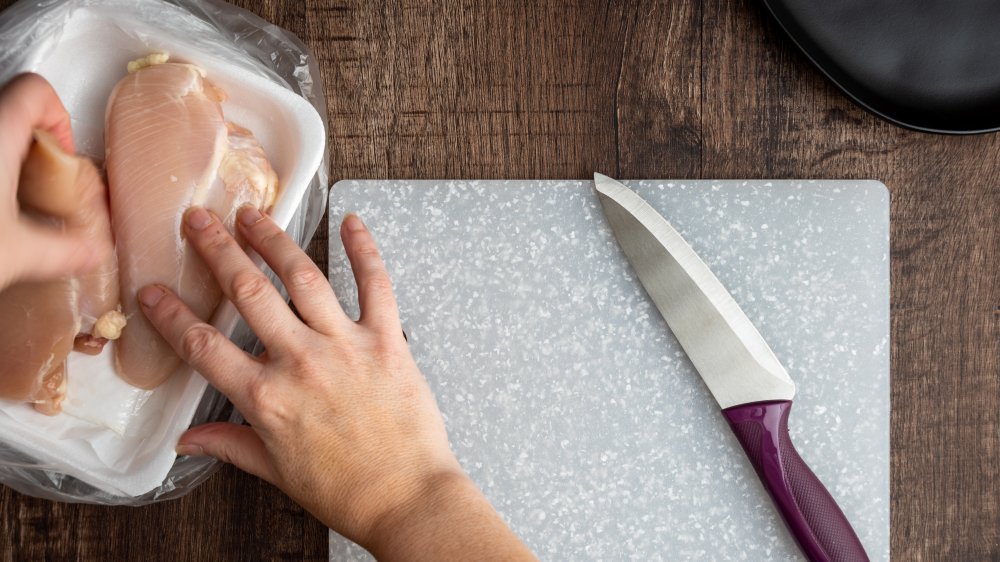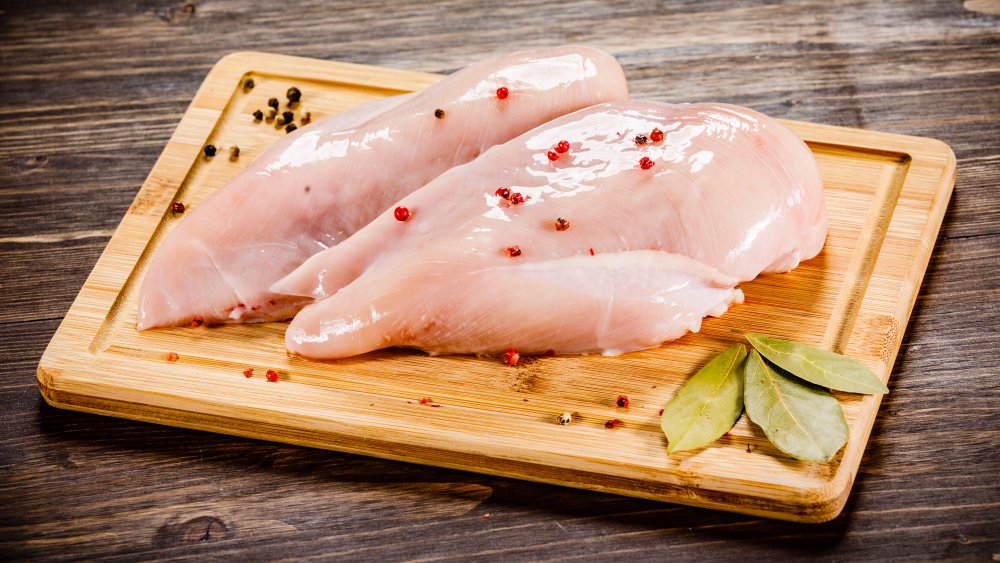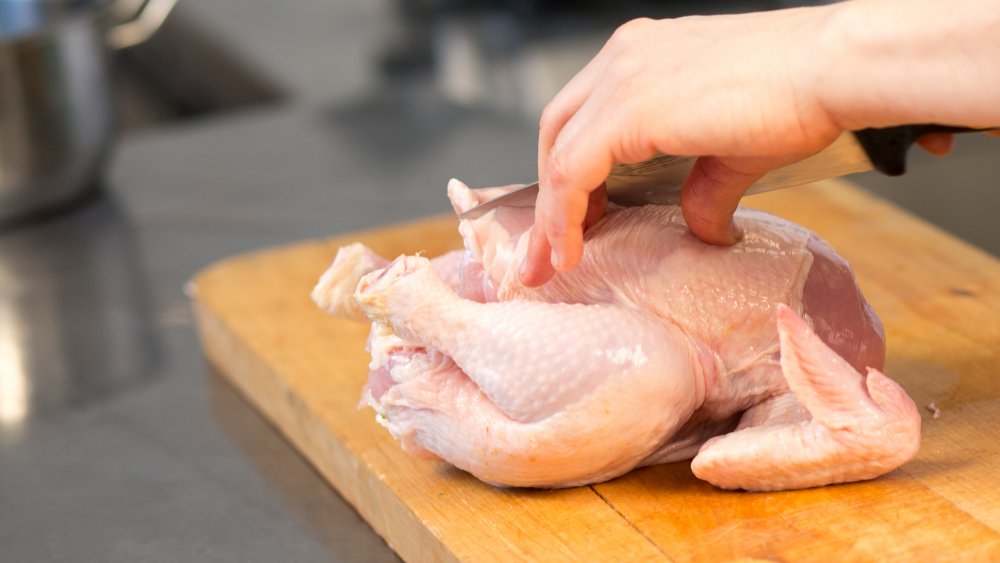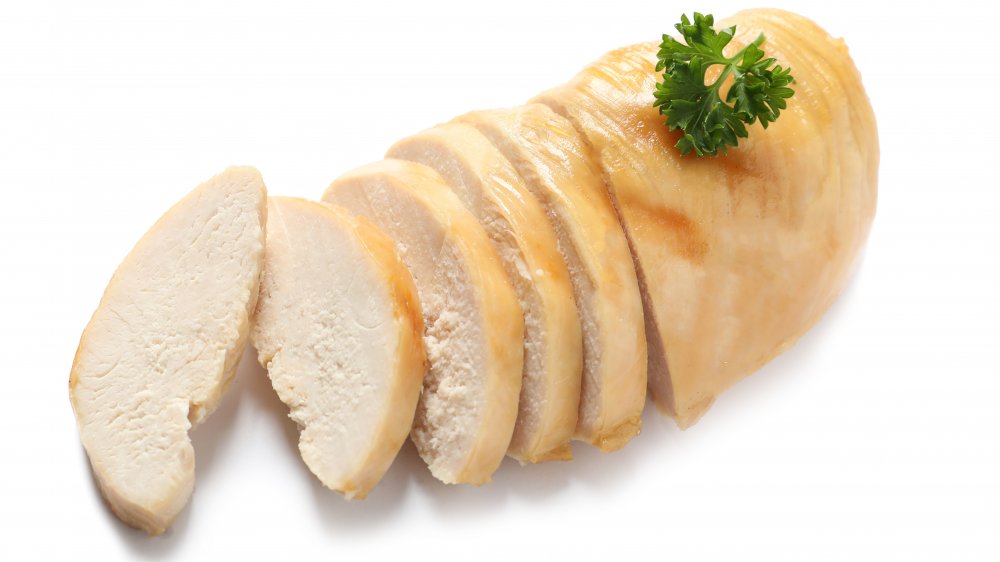Here's How To Tell If Chicken Has Gone Bad
Ever throw a package of frozen chicken in the fridge to defrost and then forget about it for a few days? Then you find yourself racking your brain trying to figure out whether it's still safe to cook or if you should just throw it out? On the one hand — the consequences of chicken-borne food poisoning are too terrible to contemplate — you may not die, but you'll spend a few days feeling as if you had. On the other, though, you spent at least half a paycheck at Whole Foods on those organic, free-range chicken breasts. How can you really tell if your chicken's gone bad?
There are a few ways to tell, and thankfully you've got everything you need to do so, as The Kitchn suggests you use your eyes, your nose, and your fingers to test out whether your chicken's a keeper or needs to be tossed.
Take a good look at your chicken
The first thing you should look at is the date on the calendar (ok, on your phone), and then try to think back — how long ago did you put the chicken in your refrigerator to thaw? The Foodsafety.gov website declares, in its official, government-sanctioned way, that two days is the max amount of time that raw chicken should spend chillin' in the fridge. If the chicken was frozen when it went in, though, the clock doesn't start ticking until it has thawed out.
According to StillTasty, 1 pound of cut-up frozen chicken parts may take up to 24 hours to thaw, as will a whole bird of up to 5 pounds. Two pounds of chicken parts or a whole 10-pound chicken may take up to two days to fully thaw.
If you're still not sure if your chicken is within the safety window, open the package and take a look. Is the flesh still in the pink? Chicken starts to turn a greyish shade as it spoils, so if you see even one single shade of grey, chuck that chicken.
Use your other senses to determine if your chicken is still good
Use your senses of smell and touch to make sure your bird is A-OK. In order to pass the sniff test, your chicken should not have any sour, pungent, or "off" odors, and it should definitely not be giving off a whiff of ammonia. If anything about that chicken smells fishy, wrap it up again and take it straight outside to the garbage can.
Finally, though it might feel kind of yucky, go ahead and touch that raw chicken flesh with your bare fingers. Raw chicken will always feel a bit slippery, but if the flesh is downright sticky or if it feels like there's some kind of thick coating on there... that chicken is very likely coated with some bad bacteria, so you should remove it from your house ASAP.
How to tell if cooked chicken has gone bad
While cooking your chicken will delay the spoiling process by a few more days, even cooked chicken is only edible for a limited period of time (via Our Everyday Life). What's more, cooked chicken must be refrigerated within an hour of coming out of the oven, otherwise it will start to breed bacteria. Once refrigerated, cooked chicken can only be kept for three days max, unless you freeze it, in which case it should last up to four months (six months if used in a soup, stew, or casserole).
If you're not quite sure whether the cooked chicken in your fridge has gone bad, it may also give you an odor indicator. As chicken does tend to absorb some of the aromas of whatever else is in your fridge, the best way to check it is to take it out of the fridge, unwrap it, and then give it a good sniff. If it smells at all funky, get rid of it. If you're still not sure, look at the color. Cooked chicken should be white or brown, so if it's starting to look a bit green or blue, consider it a safety hazard.
Better safe than sorry
The first rule of safe chicken consumption is (as with many other things that might be lurking within your fridge): when in doubt, throw it out. The second rule is, after following rule #1, get on the phone and order a nice, safe, freshly-prepared pizza.
No matter how greasy the 'za is, your stomach will still thank you when it considers how you've spared it from upset, nausea, and other digestive horrors too distasteful to mention that you'd risk had you eaten poultry past its prime. Safety first, after all, since food poisoning is worth going to any length to avoid.




